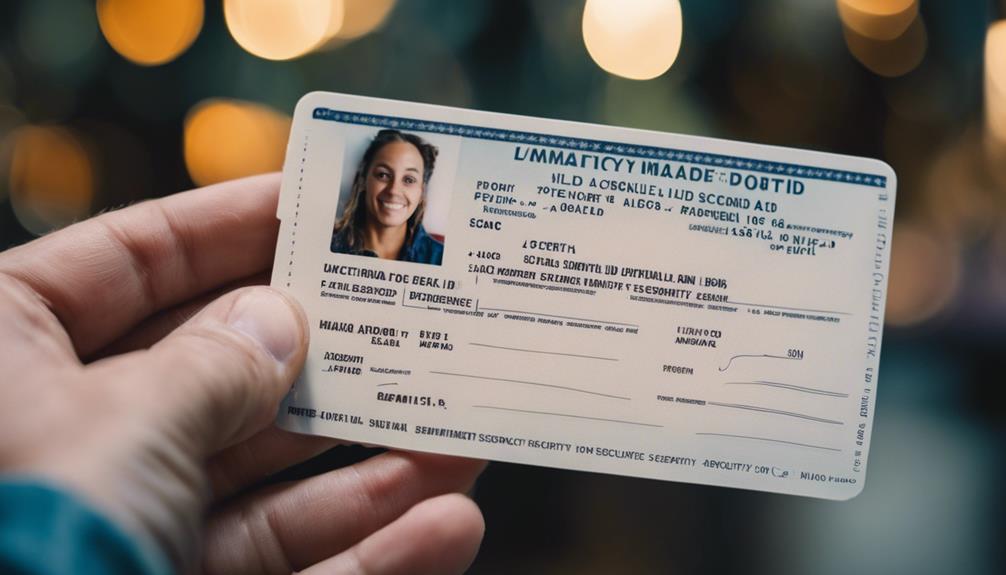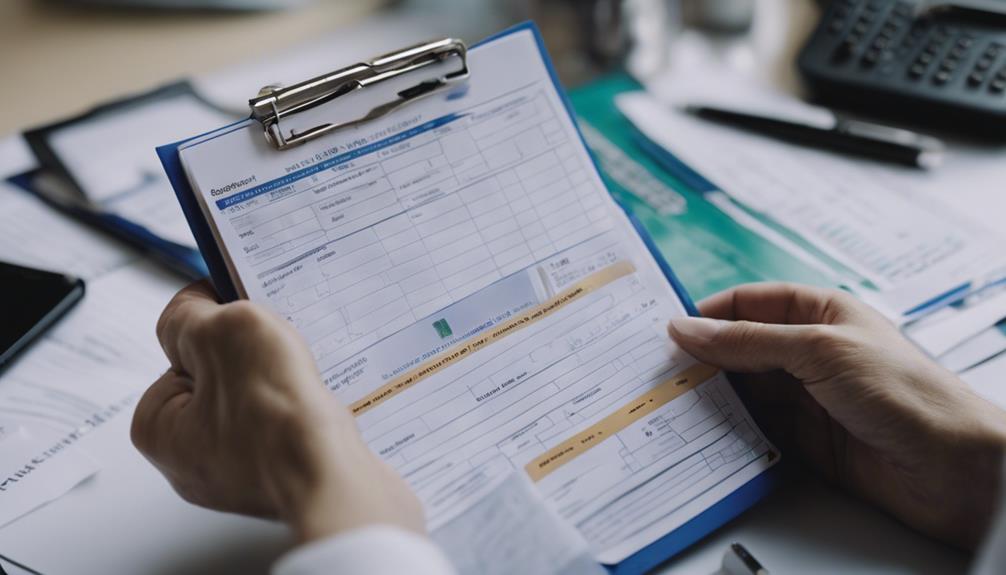For Emergency Medicaid, have your ID (driver's license, passport), social security card, and an emergency contact's info ready. Show proof of income with pay stubs or tax returns. Provide detailed medical records, following privacy rules. Ensure citizenship/residency proof matches your application. Include extra docs like financial statements to support your case. Getting these ready will make your application go smoothly and help you receive the assistance you need.
Required Personal Identification

You'll need to provide valid forms of personal identification when applying for Emergency Medicaid to verify your identity and eligibility. This is crucial for ensuring that the assistance reaches those in genuine need. Make sure to have your driver's license, passport, or state-issued ID ready. Additionally, having your social security card or birth certificate on hand will be helpful in the application process.
When listing your emergency contact, choose someone reliable who can be reached easily in case of urgent situations. Provide their name, relationship to you, and their contact information accurately. This ensures that if there are any complications with your application, the authorities can quickly get in touch with a trusted individual.
Regarding health insurance, if you have any existing coverage, be prepared to provide details about your plan. This information is necessary for determining the type of assistance you're eligible for under Emergency Medicaid. Remember, accuracy and honesty are key in this process.
Proof of Income
When submitting your Emergency Medicaid application, including proof of income is essential to determine your eligibility for assistance. Income verification plays a crucial role in assessing whether you meet the eligibility criteria for Emergency Medicaid. Providing accurate financial documentation is vital to support your application process.
To verify your income, you can include documents such as recent pay stubs, tax returns, or a letter from your employer detailing your earnings. These documents help the Medicaid office evaluate your financial situation and determine the level of assistance you may qualify for during emergencies.
Ensuring that your proof of income is up-to-date and comprehensive can expedite the application process and increase the likelihood of receiving timely assistance.
Remember that transparency in disclosing your income is key to receiving the support you need. By providing the necessary financial documentation, you're actively participating in the application process and demonstrating your commitment to fulfilling the eligibility criteria for Emergency Medicaid.
Medical Records

To streamline the Emergency Medicaid application process and assess your medical needs accurately, providing comprehensive medical records is crucial. Your medical records should include details of your medical history, treatments, and any ongoing medical conditions. It's important to ensure that your medical records are up to date and include recent information about any doctor communication and insurance coverage.
When submitting your medical records for the Emergency Medicaid application, it's essential to adhere to HIPAA compliance guidelines to protect your privacy and confidentiality. Make sure that the information provided is accurate and complete to expedite the application process and receive the necessary medical assistance promptly.
Citizenship or Residency Documentation
Ensuring that you have valid citizenship or residency documentation is crucial for your Emergency Medicaid application to be processed efficiently and accurately. The primary documents you may need to provide include your passport or birth certificate if you're a U.S. citizen. These documents serve as proof of your identity and citizenship status.
For individuals with legal residency status, it's essential to have your green card or visa documentation readily available. These documents validate your eligibility for Emergency Medicaid based on your residency status in the United States. Make sure that all the information on these documents is current and matches the details you provide in your application.
Having these citizenship or residency documents in order will help streamline the application process and ensure that you receive the necessary medical assistance promptly.
If you have any questions or need assistance gathering these documents, don't hesitate to reach out for help.
Additional Supporting Documents

Once you have gathered your citizenship or residency documentation, the next step is to prepare any additional supporting documents required for your Emergency Medicaid application. One crucial document to include is information about your emergency contact. This person should be someone who can be reached quickly in case of any urgent situations regarding your health or well-being.
Another essential document to provide is your financial statements. These statements should offer a clear overview of your current financial situation, including income, expenses, assets, and liabilities. They help Medicaid officials assess your eligibility for emergency coverage and determine the level of assistance you may receive.
Having accurate and up-to-date financial statements is crucial for demonstrating your need for emergency Medicaid assistance. Make sure to gather all relevant documents, such as bank statements, pay stubs, tax returns, and any other financial records that can support your application.
Conclusion
In conclusion, having all the essential documents ready for your emergency Medicaid application can make the process smoother and quicker. By ensuring you have your personal identification, proof of income, medical records, citizenship or residency documentation, and any additional supporting documents, you can expedite your application and receive the assistance you need in a timely manner.
Remember, preparedness is key when it comes to navigating the Medicaid application process during a time of need.
